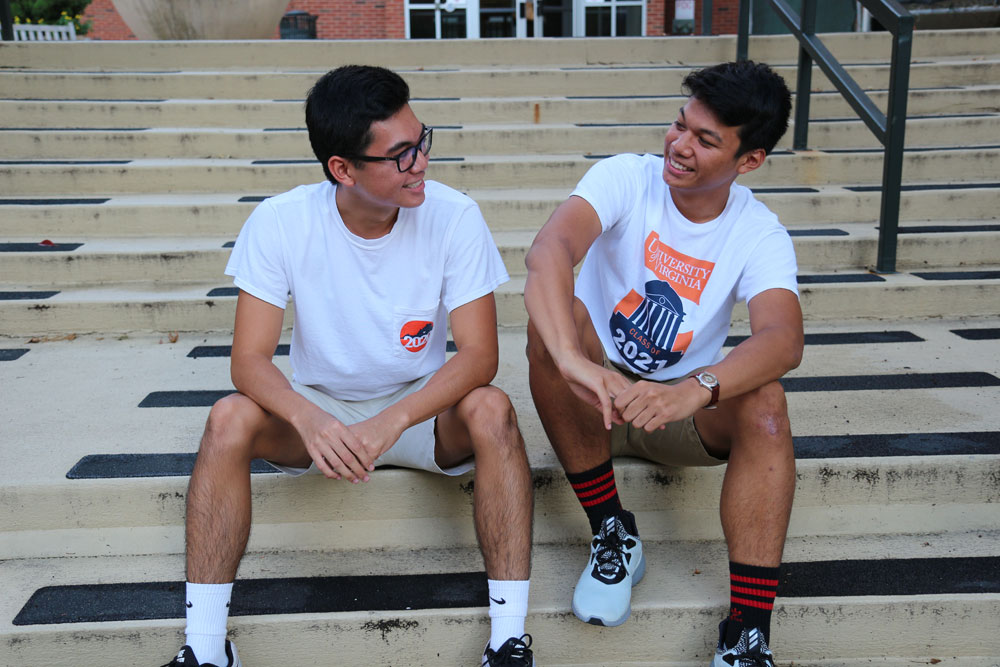Brothers’ Keeper

If brothers Ricardo and Rafael Diaz had each always considered careers in healthcare, it wasn’t until an illness, subsequent surgeries and a lengthy recovery that their paths toward nursing truly solidified.
For elder brother Ricardo, now a rising second-year student in the School of Nursing, his experience transitioning from a high school junior active in soccer, golf and swimming to a patient, weak and ailing, proved his turning point. For younger brother Rafael, today an entering first-year nursing student, it was the intensity of observing his brother’s plight and a budding determination to help him in ways both big and small.
“When I saw him so weak, and how I had to help him walk around, I cried,” recalls Rafael, who arrived Aug. 22 to start his first year of nursing courses. “All these things I could do that he could not; it was incredibly difficult.”
Diagnosed with Meckel’s diverticulitis at 17—a congenital malformation of the small intestine that affects just two percent of the population—it was January, 2015, when Ricardo found himself confined to a hospital bed and dependent on others for help with simple activities, like walking, bathing and dressing. After a violent spate of gastrointestinal illness, a trip to the ER, endless testing and, ultimately, a diagnosis, he’d undergone three surgeries, and two weeks confined to a hospital bed. Bored, uncomfortable and homesick, Ricardo recalls a nurse who tended not just his basic needs but his mental health as well.
Initially confined to a windowless, cinder-block-walled room with a roommate, she’d pulled some strings to move him to a private room with an expansive view of the Richmond skyline. That “pure empathy,” Ricardo recalls, offered a glimpse of the small kindnesses nurses offer that, for a patient, can loom large.
“Going from being someone who was very active to being someone who had trouble getting up, using the bathroom, moving around by myself—it was incredibly difficult,” Ricardo says. And while there were the issues that the body struggled with, Ricardo’s nurse “helped with what was going on in my head, too. I never forgot it. It made me realize, too, that nursing was something I could do to help others.”
Back at home some 25 pounds lighter, Ricardo’s recovery was slow, and his wounds required daily care. But fast forward six months, and the 18 year-old was back on the soccer field with a new future in mind. Applying to several schools with exceptional nursing programs his senior year, he plotted his path forward. And when UVA called to offer him the University Achievement Award, which covers tuition for all four years of study, Ricardo leapt.
It’s been a solid landing. He’s joined the MAN (Men Advancing Nursing) Club, and, while dissecting sheep eyeballs turned his stomach a bit, he’s eager to begin clinical rotations in this, his second year.
And even as brother Rafael joins him on Grounds as a fellow nursing student, the two, while happy to be close, insist they’ll each find their own way.
“I’ll seek his advice from time to time,” says Rafael, “but I’m independent, and he is too. If I need food, or a ride, I’ll still call him.”
And what do they say when asked about finding their way as men in a female-dominated profession? The question fatigues them both.
“To us, this is normal," says Ricardo plainly. "I’m doing what I want to do.”
Adds Rafael, “People say that we’ll do all the heavy lifting, as male nurses. But nurses are all doing what we need to do to care for our patients. As a nurse, and as a male, you don’t need to stand out in particular. We’re all nurses.”
###
